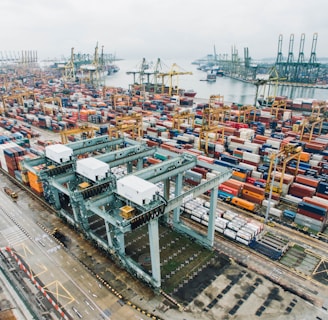Understanding Incoterms: What Every Importer & Exporter Must Know
SHIPPING & LOGISTICS
2/7/20254 min read


What Are Incoterms?
Incoterms, or International Commercial Terms, are a set of standardized trade terms published by the International Chamber of Commerce (ICC). These terms are designed to clarify the responsibilities and liabilities of buyers and sellers involved in international transactions. By establishing a common framework, Incoterms facilitate smooth trade across different legal systems and cultures, minimizing confusion and potential disputes.
The origins of Incoterms date back to 1936, when they were first introduced to provide a consistent set of definitions within international trade. Over the decades, these terms have been revised to reflect the changing nature of global commerce and transport. The most recent revision occurred in 2020, which reflected modern practices in logistics and transport, ensuring their relevance in today's business environment.
Incoterms serve several vital purposes. Firstly, they delineate the responsibilities of both exporters and importers in terms of the physical transport of goods. Each term specifies who is responsible for shipping, insurance, duties, and costs, creating clarity and reducing misunderstandings. For instance, terms like FOB (Free On Board) or CIF (Cost Insurance and Freight) clearly indicate at what point the responsibility transfers from the seller to the buyer, thus defining the extent of risk each party assumes during the transportation process.
Moreover, Incoterms contribute to the efficient management of international logistics. By standardizing trade terms, they enable smoother documentation and compliance with customs requirements. This consistency aids in reducing delays and costs associated with shipping and customs clearance, ultimately fostering trust and efficiency in global trade. In today’s interconnected economy, understanding Incoterms is indispensable for all parties engaged in international commerce, as they enhance clarity around shipping responsibilities, costs, and risks.
The 11 Incoterms: A Closer Look
Incoterms, or International Commercial Terms, play a pivotal role in global trade by clearly defining the responsibilities of buyers and sellers in international transactions. Currently, there are 11 recognized Incoterms, and each defines the obligations regarding transportation, insurance, and customs duties of goods being traded. Understanding these terms is essential for both importers and exporters to navigate potential risks effectively.
The first term, EXW (Ex Works), places the maximum responsibility on the buyer, requiring them to take care of all logistics from the seller’s location.
In contrast, FOB (Free On Board) indicates that the seller covers costs and risks up to the point the goods are loaded onto the transport vessel.
Next is CIF (Cost, Insurance, and Freight), where the seller bears the costs of transporting and insuring the goods to the port of destination.
Moving on, we have DAP (Delivered at Place), which obligates the seller to bear all risks and costs until the goods are made available for unloading at the destination.
DDP (Delivered Duty Paid) extends this responsibility further by including customs duties. This makes DDP the most seller-friendly term, providing a comprehensive service level.
Other terms include FAS (Free Alongside Ship), which is used for maritime transport, and CFR (Cost and Freight), a variant of CIF that does not include insurance. CIP (Carriage and Insurance Paid To) is similar to CIF but applicable to any transport mode. Moreover, DAT (Delivered at Terminal) involves delivery at a specified terminal, excluding after-delivery and customs clearance.
Finally, the term DPU (Delivered at Place Unloaded) denotes that the seller is responsible for delivering and unloading at the agreed location.
Each Incoterm carries specific implications, and choosing the right one depends on the trade context and transport mode, ultimately facilitating smooth transactions in international trade.
Impact of Incoterms on Shipping Responsibilities
Incoterms, or International Commercial Terms, play a pivotal role in international shipping and have a significant impact on the logistics of transporting goods between countries. These terms are designed to delineate the responsibilities of buyers and sellers during the process of shipment, thus playing a critical role in the allocation of costs, assignment of risk, and determination of liability throughout the import and export procedure. Choosing the appropriate Incoterm can lead to considerable differences in shipping costs and potential disputes, making understanding these terms vital for both importers and exporters.
For instance, under the widely-used Incoterm “CIF” (Cost, Insurance, and Freight), the seller assumes responsibility for the costs associated with transportation to the named port of destination, including insurance. Conversely, with the “FOB” (Free on Board) term, the seller’s responsibility ends once the goods are loaded onto the vessel, shifting risk to the buyer thereafter. This illustrates how the choice of Incoterm dictates not only expense distribution but also plays a significant role in risk management and liability exposure.
Another critical aspect of Incoterms is the common misunderstandings surrounding them. Many parties mistakenly believe that the term indicates the ownership transfer of goods rather than detailing transportation responsibilities. This misconception can lead to confusion about the point at which the risk transfers from seller to buyer, resulting in potential disputes. To mitigate these risks, it is essential for both parties to communicate clearly about the chosen Incoterms in their shipping agreements, ensuring that all parties have a mutual understanding of their responsibilities and liabilities throughout the shipping process. Proper education about Incoterms can facilitate smoother international transactions and reduce the likelihood of disputes.
Best Practices for Importers and Exporters
When engaging in international trade, selecting the appropriate Incoterm is crucial as it dictates the responsibilities and risks involved. Importers and exporters should thoroughly evaluate the nature of their transactions before committing to a specific Incoterm. Factors such as the mode of transport, insurance requirements, and the points of transfer are essential considerations. For instance, in transactions involving high-value goods, opting for Incoterms like CIF (Cost, Insurance, and Freight) provides a safeguard for both parties, ensuring that insurance coverage is included during transit.
Negotiation remains a fundamental aspect of trading relationships. It is recommended that importers and exporters discuss Incoterms openly with their trading partners. Understanding each party's specific needs and concerns can facilitate a more favorable agreement. It is beneficial to approach negotiations with an awareness of the implications of different terms. By doing this, both sides can establish clear expectations regarding transportation, delivery timelines, and cost liabilities.
Including Incoterms in contracts and invoices serves as a legal foundation for international agreements. This practice not only clarifies responsibilities but also minimizes disputes arising from misunderstandings. Importers and exporters should ensure that the precise Incoterm used is explicitly stated in all documentation related to the transaction. Additionally, consistently reviewing and updating these terms within contracts can promote clarity, particularly as trade regulations evolve.
Moreover, ongoing education regarding Incoterms is essential for all parties involved in international trade. Staying informed about any changes or revisions to these terms enables importers and exporters to navigate potential risks effectively. Workshops, online resources, and professional seminars can provide valuable insights, ultimately enhancing operational efficiency and fostering a smoother trading environment.
